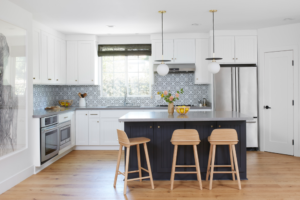 Planning a kitchen remodel is an exciting venture that can significantly enhance the functionality, aesthetics, and value of your home. However, determining a realistic budget for this project is crucial to ensure a successful renovation without breaking the bank. With a multitude of factors to consider, from materials and labor costs to the scope of work, setting a feasible budget can seem daunting. Let’s explore the key aspects to consider when estimating a realistic budget for a kitchen remodel.
Planning a kitchen remodel is an exciting venture that can significantly enhance the functionality, aesthetics, and value of your home. However, determining a realistic budget for this project is crucial to ensure a successful renovation without breaking the bank. With a multitude of factors to consider, from materials and labor costs to the scope of work, setting a feasible budget can seem daunting. Let’s explore the key aspects to consider when estimating a realistic budget for a kitchen remodel.
- Define Your Goals: Before diving into budget considerations, outline your renovation goals. Are you aiming for a minor facelift with cosmetic changes, or is a complete overhaul on the agenda? Identifying your priorities will help allocate funds where they matter most.
- Research and Planning: Conduct thorough research to understand current market prices for materials, appliances, and labor in your area. Consulting with contractors, visiting showrooms, and exploring online resources can provide valuable insights into costs. Additionally, create a detailed plan outlining the changes you want to make in your kitchen.
- Budget Breakdown: A realistic budget for a kitchen remodel typically includes various components:
- Materials: Cabinets, countertops, flooring, backsplash, lighting fixtures, appliances, and other finishes.
- Labor Costs: Installation, plumbing, electrical work, and professional fees.
- Contingency Fund: Allocate around 10-20% of your total budget for unexpected expenses or changes during the renovation process.
- Determining Cost Factors:
- Size of the Kitchen: Larger kitchens generally require more materials and labor, impacting the overall cost.
- Quality of Materials: Opting for high-end materials will increase expenses, while budget-friendly options can help save money.
- Complexity of Design: Elaborate designs, customizations, and structural changes will drive costs higher.
- Appliances: Upgrading to premium appliances significantly impacts the budget. Consider whether you need all new appliances or if existing ones can be incorporated into the design.
- Setting Realistic Expectations: It’s essential to balance aspirations with practicality. While you may dream of a gourmet kitchen, consider whether it aligns with your home’s value and your long-term plans. Striking a balance between functionality, aesthetics, and budget is key.
- Prioritizing Expenses: Determine which elements of the kitchen are most important to you. Allocate a larger portion of your budget to areas that matter most, such as quality cabinets or durable countertops, while being more conservative with less critical aspects.
- Seeking Professional Advice: Consulting with experienced contractors or designers can offer valuable guidance in budget planning. They can provide estimates based on your requirements, helping you align your expectations with realistic costs.
- DIY vs. Professional Help: Consider whether you have the skills and time to tackle certain tasks yourself. While DIY projects can save money, complex jobs like electrical or plumbing work might require professional assistance to ensure safety and compliance with regulations.
- Avoiding Scope Creep: Stick to your initial plan as much as possible. Changes or additions during the project can significantly inflate costs. Having a clear vision and plan in place helps control unnecessary spending.
- Review and Flexibility: Regularly review your budget throughout the renovation process. Be prepared to adjust allocations based on unexpected expenses or changes in priorities.
In conclusion, determining a realistic budget for a kitchen remodel involves careful consideration of multiple factors. While there’s no one-size-fits-all approach, thorough research, planning, and a clear understanding of your goals are essential. By prioritizing expenses, seeking professional advice, and staying flexible, you can create a budget that aligns with your vision while ensuring a successful and cost-effective renovation.

